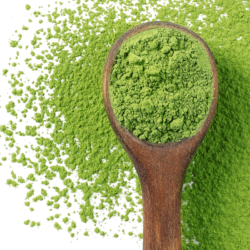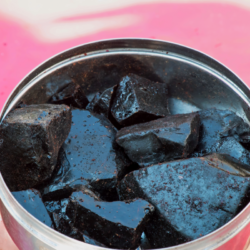Sea buckthorn, often referred to as the “tree of a thousand virtues”, is a plant with multiple benefits. Among its most valuable components are omega 7s, fatty acids that are still little-known but have impressive properties. Let’s find out more about the benefits of omega 7s and why they deserve a special place in our diet.
Omega 7 is a specific category of monounsaturated fatty acids, less well known than omega 3 and omega 6, but just as important for our health. The main fatty acid in this category is palmitoleic acid. Unlike other essential fatty acids, omega 7s are not classed as essential because our bodies can synthesise them in small quantities. However, their intake through the diet can offer significant health benefits.
Palmitoleic acid stands out for its anti-inflammatory and metabolic properties. It helps regulate lipid metabolism and plays a crucial role in maintaining the fluidity of cell membranes, facilitating better intercellular communication and efficient nutrient exchange.
What are the different types of omega 7?
Omega 7s are not limited to palmitoleic acid. Other fatty acids belonging to this family include vaccenic acid and keto-palmitoleic acid. Each of these fatty acids has unique properties:
- Palmitoleic acid: The most studied of the omega 7s, known for its beneficial effects on lipid metabolism and reducing inflammation.
- Vaccenic acid: Present in animal fats and milk, it can be converted into palmitoleic acid by the human body.
- Keto-palmitoleic acid: A metabolite of palmitoleic acid, which also plays a role in modulating inflammation and lipid metabolism.
These different types of omega 7 collectively contribute to a range of essential biological functions, supporting cardiovascular health, weight regulation and skin integrity.
Where can I find Omega 7?
To reap the benefits of omega 7 s, it’s important to be aware of their natural sources. Foods rich in omega 7 include plants and specific animal products:
- Sea buckthorn: Sea buckthorn berries are one of the most concentrated sources of omega 7, particularly palmitoleic acid. They also contain a rich array of nutrients, including vitamins and antioxidants.
- Macadamia oil: This oil is an excellent source of monounsaturated fatty acids, including omega 7. It is also beneficial for cardiovascular health and can be used in cooking.
- Fish: Some fish, such as anchovies and sardines, contain significant amounts of omega 7, in addition to other beneficial fatty acids such as omega 3.
- Milk and dairy products: Dairy products contain vaccenic acid, which can be converted into palmitoleic acid by the body.
What are the health benefits of omega 7?
Is sea buckthorn oil beneficial for cardiovascular health?
Omega 7s play a crucial role in maintaining cardiovascular health. There are two main mechanisms behind these benefits: reduced inflammation and improved blood circulation.
Omega 7s, particularly palmitoleic acid, have powerful anti-inflammatory properties. They reduce the production of pro-inflammatory cytokines, molecules involved in chronic inflammatory processes that can damage arterial walls. By reducing inflammation, omega 7 helps prevent atherosclerosis, a condition characterised by the accumulation of plaque in the arteries, which can lead to heart disease.
Omega 7 also helps improve blood circulation by reducing LDL (bad) cholesterol levels and increasing HDL (good) cholesterol levels. This promotes better blood circulation and reduces the risk of blood clots, which are essential for preventing heart attacks and strokes.
How can I protect my gastric mucosa naturally?
The benefits of omega 7 also extend to the digestive system, in particular by protecting the gastric mucosa and facilitating digestion.
Omega 7 helps maintain the integrity of the gastric mucosa, the protective layer of the stomach. They strengthen this barrier, reducing the risk of gastric ulcers and other digestive disorders. Palmitoleic acid, for example, stimulates the production of protective mucus and promotes the healing of damaged tissue.
As well as protecting the gastric mucosa, omega 7 aids digestion by reducing intestinal inflammation and promoting better absorption of nutrients. This can help prevent conditions such as irritable bowel syndrome (IBS) and improve overall intestinal health.
How to boost lipid metabolism with omega 7?
Omega 7s play a significant role in lipid metabolism, influencing the way fat is stored and used by the body. Palmitoleic acid is particularly effective in increasing sensitivity to insulin, a key hormone in the regulation of carbohydrate and lipid metabolism. Increased sensitivity to insulin allows better absorption of glucose by the cells, thereby reducing blood sugar levels and lowering the risk of type 2 diabetes.
Omega 7 also regulates the expression of genes involved in lipogenesis (fat synthesis) and lipolysis (fat breakdown). They promote the breakdown of lipids stored in adipose tissue and their use as a source of energy, helping to reduce fat deposits and prevent obesity.
Omega 7 also influences the production of cholesterol and triglycerides. They reduce the synthesis of these lipids in the liver, which can lower blood lipid levels and thus reduce the risk of cardiovascular disease.
What effects does sea buckthorn oil have on inflammation?
Omega 7s have notable anti-inflammatory properties. Palmitoleic acid, in particular, acts as an inflammation regulator by modulating the production of inflammatory cytokines. These signal molecules are responsible for the body’s inflammatory response, which, although necessary for healing and defending against infection, can cause tissue damage when it becomes chronic.
Palmitoleic acid reduces the production of pro-inflammatory cytokines such as tumour necrosis factor-alpha (TNF-α ) and interleukin-6 (IL-6), while increasing the production of anti-inflammatory cytokines such as interleukin-10 (IL-10). This modulation helps to prevent chronic inflammation, which is associated with various degenerative diseases such as cardiovascular disease, type 2 diabetes and certain forms of cancer.





